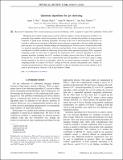Quantum algorithms for jet clustering
Author(s)
Wei, Annie Y.; Naik, Preksha; Harrow, Aram W.; Thaler, Jesse
DownloadPublished version (848.1Kb)
Publisher with Creative Commons License
Publisher with Creative Commons License
Creative Commons Attribution
Terms of use
Metadata
Show full item recordAbstract
Identifying jets formed in high-energy particle collisions requires solving optimization problems over potentially large numbers of final-state particles. In this work, we consider the possibility of using quantum computers to speed up jet clustering algorithms. Focusing on the case of electron-positron collisions, we consider a well-known event shape called thrust whose optimum corresponds to the most jetlike separating plane among a set of particles, thereby defining two hemisphere jets. We show how to formulate thrust both as a quantum annealing problem and as a Grover search problem. A key component of our analysis is the consideration of realistic models for interfacing classical data with a quantum algorithm. With a sequential computing model, we show how to speed up the well-known O(N3) classical algorithm to an O(N2) quantum algorithm, including the O(N) overhead of loading classical data from N final-state particles. Along the way, we also identify a way to speed up the classical algorithm to O(N2logN) using a sorting strategy inspired by the siscone jet algorithm, which has no natural quantum counterpart. With a parallel computing model, we achieve O(NlogN) scaling in both the classical and quantum cases. Finally, we consider the generalization of these quantum methods to other jet algorithms more closely related to those used for proton-proton collisions at the Large Hadron Collider.
Date issued
2020-05Department
Massachusetts Institute of Technology. Center for Theoretical Physics; Massachusetts Institute of Technology. Department of PhysicsJournal
Physical Review D
Publisher
American Physical Society (APS)
Citation
Wei, Annie Y. et al. “Quantum algorithms for jet clustering.” Physical Review D, 101, 9 (May 2020): 094015 © 2020 The Author(s)
Version: Final published version
ISSN
2470-0010